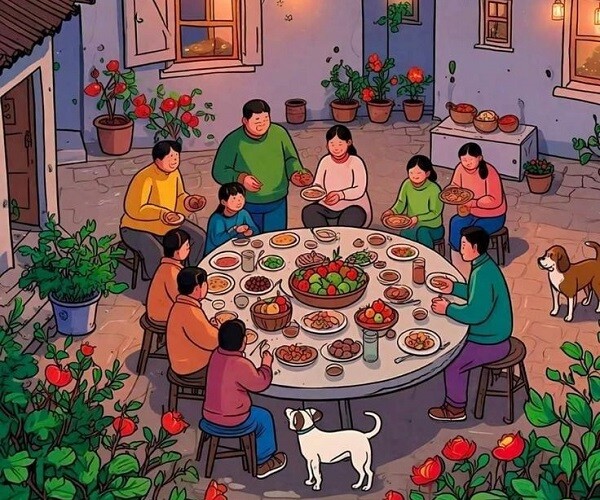Last week, my grandmother brought me chicken soup for lunch at school. After tasting it, I told her it wasn’t as good as my maternal grandmother’s soup. This made her feel sad and hurt, as if she had raised an ungrateful child.
“When she was little, no matter how much pain I was in, all it took was for her to cry and I would hold her in my arms,” she said. “Why is it that now that I’ve raised her, she’s become distant from me?”
Indeed, this situation can be hurtful, but it’s a reality for many families around us.
In many cases, both paternal and maternal grandmothers are devoted to taking care of their grandchildren, not wanting to miss out on their growth.
But as they grow up, children tend to become closer to one of the grandmothers. This has left many people wondering what’s happening and if it has something to do with the amount of time spent with the grandchildren.


Time spent together is not the same as emotional intensity
In psychology, there’s a concept called “Secure Attachment.” Simply put, a child will establish a sense of certainty that “I am loved and understood” through a particular person.
This sense of security often comes from “certainty” and tends to determine the child’s future emotional inclinations more than just being “cared for over a long period.”
For example, if the child cries in the middle of the night, the grandmother might pick them up, pat their back, and hum a lullaby. Or she might touch the child’s forehead to check their temperature, observe if they’re hungry or uncomfortable, turn off the lights, hum a song, and soothe them to sleep.

The child will develop a sense of certainty that they are loved and understood.
On the surface, these actions seem like care and concern, but they evoke different emotions in the child.
Because most of the time, what the child remembers is not “who hugged me” but “who made me feel safe.”
Fundamentally, it’s not about “whose cooking is better,” but when the child is at their most vulnerable, the grandmother will provide a sense of security that “I’m always here.”
This sense of security is like a seed planted in the child’s heart. No matter how far they go in the future, it will warm their heart and make them feel nostalgic.
Therefore, if you want to know which grandmother the child is closer to, if they are raised by both paternal and maternal grandmothers, look at both of them and see who has grasped the child’s critical development stages and who has established a secure attachment.

A child’s emotions are hidden in the details of their development
The formation of any secure relationship is never achieved overnight, nor can it be shaped by just one “important event.”
Instead, it is reflected in the details of the child’s development.
Ages 0-3: Basic needs for survival are met accurately
Children at this stage are like young plants; the most important thing is the certainty that “I can survive.”
Anyone who feeds the child when they’re hungry, changes their diaper when they pee, and responds when they cry will tend to form an attachment with the child.
These seemingly ordinary details will make the child dependent on the “caregiver” to meet their most basic survival needs. This is crucial for infants.

A child’s emotions are hidden in the details of their development.
Ages 3-6: Emotional needs for acceptance are met gently
After the age of three, children gradually develop self-awareness.
They will cry if their toys are taken away and feel sad if they are bullied by other children.
At this stage, anyone who listens to them say “I’m not happy”, and anyone who is willing to try again with them after failing to assemble a Lego set, will gain the child’s trust.
Psychological research has found that children’s “emotional memory” before the age of four is the deepest, and moments of patient treatment will become the foundation for trusting others in the future.
Ages 6 and above: Mental needs for understanding are met
After entering elementary school, the child’s world expands.
They face academic pressure, conflicts with peers, and even confusion about “Who am I.”
At this stage, anyone willing to listen to the child’s secrets about their classmates and exciting school events, and anyone who can help them solve difficult academic problems, will form a close bond with the child.
For example, A Tinh was a top student in second grade, but he listened to his grandmother. She never scolded him for misbehaving. Instead, she would say, “When I was your age, I also found school challenging and acted up sometimes, but I got through it by studying harder.”
These details are like threads that tightly bind the child to a specific “family member.”
Therefore, the sense of closeness and filial piety is instinctual in children who want to repay the person who once “understood them” after growing up.

The sense of closeness and filial piety is instinctual in children.

True closeness is not a transaction of “Who gives more”
In reality, a child’s love for their family members basically reflects their feeling of being “Seen.”
Moments when their words are taken seriously imprint the label of “Important Person” in their minds, creating deep and lasting emotional connections.
So, stop worrying about “Which grandmother does the child love more?” Instead of competing for recognition, it’s better to think about whether we have given the child the confidence that “I am here”.

Moments of love and care are deeply etched in a child’s mind.
At the age when children need to be understood, do adults have the patience to listen to what they want to share?
In reality, whether a child is closer to one grandparent or the other is not the result of “Who takes care of them more,” but rather the answer lies in “Who makes the child feel certain that they are loved.”
This highlights the importance of the emotional connections children establish with their grandparents and parents. Those who make children feel safe, loved, and understood will always hold a special place in their hearts.
Love, understanding, and support are the foundation for a child’s development and a precious gift they will carry throughout their lives.
The Golden Age Beckons: 3 Years of Abundant Fortune as Buddha Opens the Wealth Vault, Filling Homes with Gold and Prosperity
The zodiac signs are about to experience a period of immense fortune and prosperity. From now until the full moon on the 15th, their luck will soar, bringing with it a wave of abundance and success. This auspicious phase will see their lives transform for the better, with wealth and opportunities flowing their way.
The Stars Align for Three Zodiac Signs: A Life-Changing Romance for the Lucky One
In mid-May, three zodiac signs will experience a sudden surge of good fortune in their love lives. The first sign, in particular, may encounter a significant turning point in their current relationship, indicating a potential shift towards a deeper and more passionate connection. This astrological alignment promises an exciting period for these lucky signs, bringing with it the potential for romance, intimacy, and lasting happiness.






































